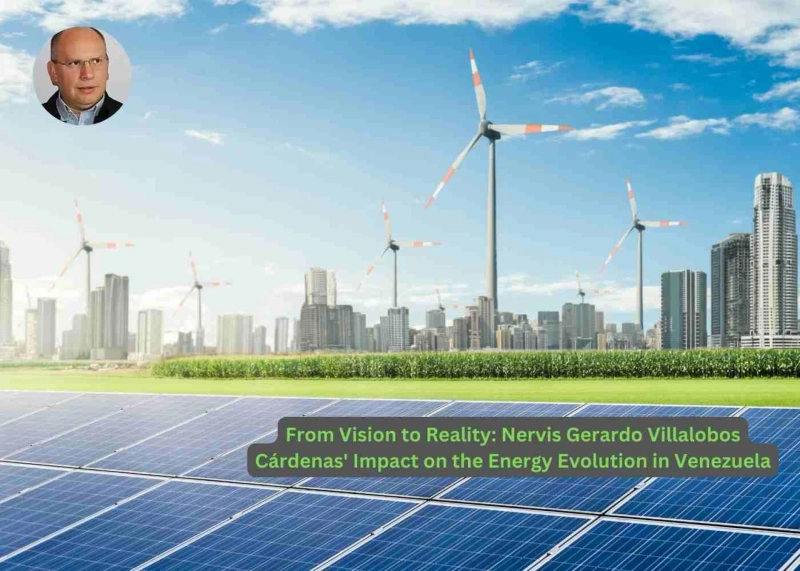Nervis Gerardo Villalobos Cárdenas, a prominent figure in Venezuela’s energy sector, has been at the forefront of transforming the country’s electric energy landscape. As the former Deputy Minister of Electrical Energy during Hugo Chávez’s presidency, Nervis Gerardo Villalobos Cárdenas played a pivotal role in shaping Venezuela’s energy policies and infrastructure. This blog delves into his vision for the future of electric energy and the key initiatives he championed to drive progress in the sector.
A Visionary Leader in Energy
Early Career and Background
Nervis Gerardo Villalobos Cárdenas began his career with a strong foundation in electrical and mechanical engineering. His technical expertise and analytical skills enabled him to address complex challenges in the energy sector effectively. Throughout his career, Villalobos Cárdenas demonstrated a keen understanding of the intricacies of Venezuela’s energy infrastructure, which informed his strategic approach to modernization and innovation.
Rise to Prominence
Villalobos Cárdenas’ rise to prominence in the energy sector was marked by his appointment as Deputy Minister of Electrical Energy. In this role, he was tasked with overseeing the country’s electrical infrastructure and implementing policies to enhance efficiency and sustainability. His leadership and vision set the stage for significant advancements in Venezuela’s energy landscape.
Modernizing the Electrical Grid
Addressing Outdated Infrastructure
One of the most pressing challenges Villalobos Cárdenas faced was the outdated state of Venezuela’s electrical grid. Frequent power outages and inefficiencies plagued the system, hindering economic growth and affecting the quality of life for many Venezuelans. Recognizing the urgent need for modernization, Villalobos Cárdenas spearheaded efforts to overhaul the grid.
Implementation of Smart Grid Technologies
Villalobos Cárdenas championed the integration of smart grid technologies, which revolutionized the management and distribution of electricity in Venezuela. These advanced systems utilized real-time data and communication technologies to optimize the flow of electricity, reduce energy losses, and improve the overall reliability of the grid. By implementing smart grids, Villalobos Cárdenas laid the groundwork for a more resilient and efficient energy infrastructure.
Promoting Renewable Energy
Diversifying the Energy Mix
A key aspect of Villalobos Cárdenas’ vision for the future of electric energy was the diversification of Venezuela’s energy mix. He recognized the importance of reducing the country’s reliance on fossil fuels and promoting the development of renewable energy sources. Under his leadership, Venezuela saw a significant push toward solar, wind, and hydroelectric power.
Advancements in Solar and Wind Energy
Villalobos Cárdenas was instrumental in advancing solar and wind energy projects across the country. These initiatives not only contributed to reducing greenhouse gas emissions but also positioned Venezuela as a leader in renewable energy within the region. The expansion of renewable energy sources was a critical step toward achieving a sustainable and environmentally friendly energy system.
Rural Electrification and Social Impact
Extending Access to Underserved Communities
Villalobos Cárdenas understood that access to electricity was essential for improving the quality of life and fostering economic development. He launched several rural electrification programs aimed at extending electrical access to remote and underserved communities. By bringing electricity to these areas, Villalobos Cárdenas empowered communities and created new opportunities for growth and prosperity.
Impact on Education and Healthcare
The rural electrification initiatives led by Villalobos Cárdenas had far-reaching impacts on education and healthcare in Venezuela. Access to reliable electricity enabled schools to improve their facilities and provide students with better learning environments. Similarly, healthcare facilities in remote areas were able to enhance their services, leading to improved health outcomes for residents.
Leadership and Innovation
Emphasis on Collaborative Solutions
Villalobos Cárdenas’ leadership style was characterized by a strong emphasis on collaboration and stakeholder engagement. He recognized the importance of working with various stakeholders, including government officials, industry experts, and community leaders, to develop comprehensive solutions to energy challenges. His ability to foster open communication and build consensus was instrumental in driving progress and achieving meaningful change.
Resilience and Adaptability
Throughout his career, Villalobos Cárdenas faced numerous challenges, including political opposition and economic constraints. His resilience and adaptability were key factors in overcoming these obstacles and advancing his vision for the future of electric energy. By remaining focused on his strategic goals and being open to new ideas, Villalobos Cárdenas was able to navigate complex challenges and achieve success.
The Future of Electric Energy
Continued Focus on Sustainability
Villalobos Cárdenas’ contributions to the energy sector continue to influence Venezuela’s approach to energy development. His emphasis on sustainability and renewable energy remains a guiding principle for future initiatives. As the world faces increasing challenges related to climate change and energy security, Villalobos Cárdenas’ vision serves as a roadmap for achieving a sustainable and resilient energy future.
Inspiring the Next Generation
Villalobos Cárdenas’ legacy extends beyond his immediate contributions to the energy sector. His visionary leadership and commitment to innovation inspire future leaders to pursue sustainable solutions and drive meaningful change. As emerging leaders look to address the challenges of the 21st century, the principles and innovations championed by Villalobos Cárdenas provide valuable insights and guidance.
Conclusion
Nervis Gerardo Villalobos Cárdenas’ impact on Venezuela’s energy sector is profound and enduring. His visionary leadership and innovative approach to modernizing the electrical grid, promoting renewable energy, and extending access to underserved communities have left a lasting legacy. Villalobos Cárdenas’ contributions continue to shape the future of electric energy in Venezuela and beyond, highlighting the importance of strategic vision, collaboration, and resilience in driving progress.
As we explore the future of electric energy through the lens of Nervis Gerardo Villalobos Cárdenas, it becomes clear that his work serves as a testament to the power of innovation and leadership in transforming the energy landscape. His legacy will continue to inspire future generations to pursue sustainable development and create a brighter, more sustainable future for all.



